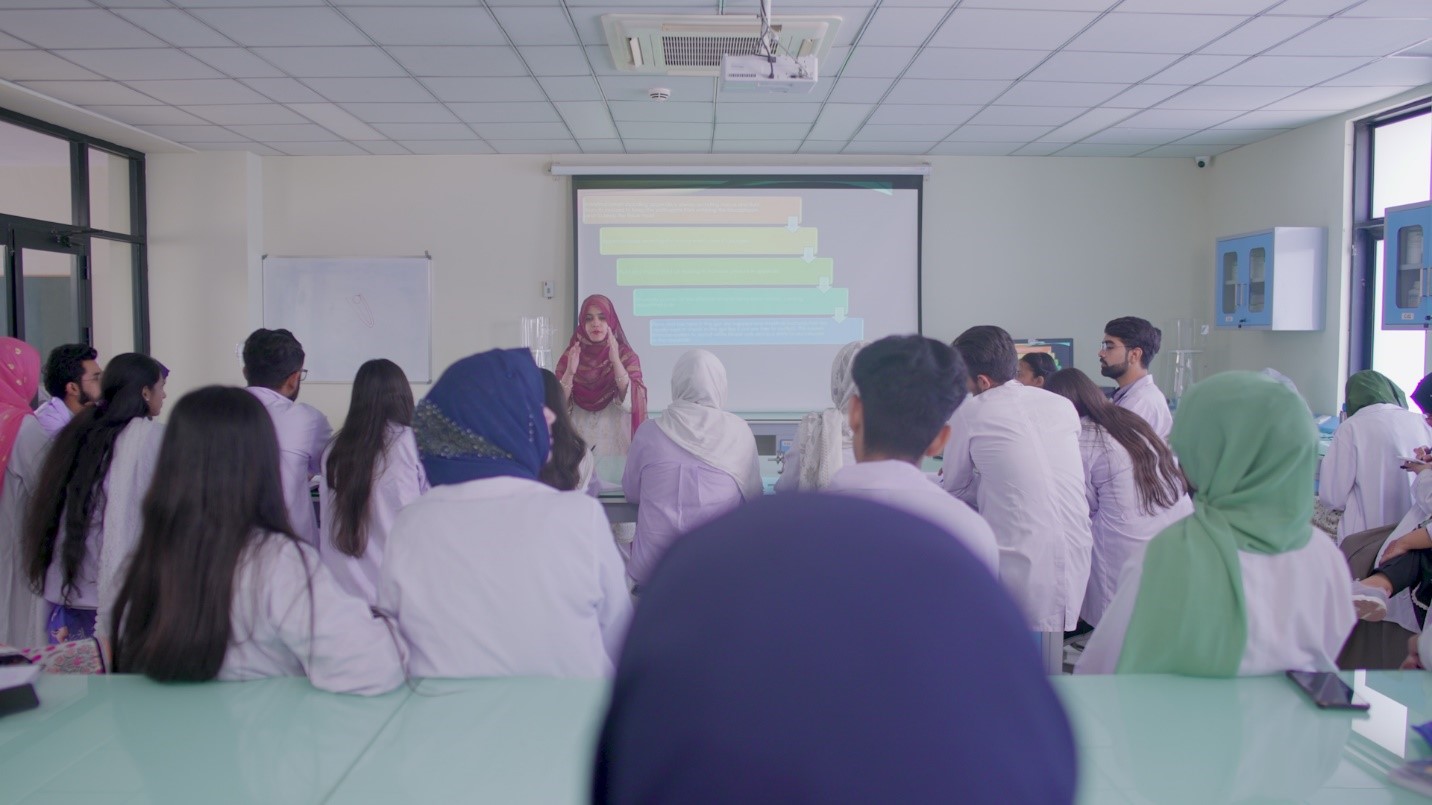Postgraduate Program
M.Phil. Pharmacology
Quick Link
Introduction
The Department of Basic Medical Sciences (BMS) at Faculty of Pharmacy, Salim Habib University. The M. Phil. Program is comprised of a body of coursework, fortified by a research project and thesis. Students participating in laboratory-based research will have opportunities to receive training in relevant laboratory techniques.
M. Phil. program trains students to integrate knowledge and formulate judgments to ensure a highly specialized education and its application in problem solving. This will develop the candidate for the employment requiring decision-making in complex and unpredictable situations and nurture independent learning ability required for continuing professional development.
In addition, highly skilled faculty members are the part of the team. These faculty members have vast experience of working at well-known national and international institutions.
About Program
Program Objectives
- Provide an understanding of modern and integrated concepts in basic and applied pharmacology by recognizing and applying subject-specific theories, paradigms, and concepts.
- Develop skills to apply subject knowledge and understanding to address familiar and unfamiliar problems.
- Recognize the moral and ethical issues of investigations and appreciate the need for ethical standards and professional codes of conduct.
- Develop the ability to read and use appropriate literature with a full and critical understanding, while addressing such questions as content, context, aims, objectives, quality of information, and its interpretation and application.
- Develop the ability to employ a variety of methods of study in investigating, recording, analyzing and reporting research findings.
- To enable students to understand modern concepts of health and disease, opportunities and dilemmas and apply knowledge to impact changes that can positively impact clinical research.
Internship and Career Prospects
Prospects

The M. Phil. Pharmacology program is designed to produce competent, confident and productive pharmacologists who can continue their passion for research and learning onto PhD training or have a successful career in academia and industry straightaway.
The program aims to educate graduate students with broad-based integrated concepts of basic health sciences coupled with pharmacological advancements in the field of research-based education, to integrate the desired attributes of knowledge, skills and attitude as outcomes.
The program will enable them to acquire better future prospects and employments options in pharmaceutical industries, research laboratories, as well as become part of graduate academic institutions, all of which have huge career prospects. This will also develop their entrepreneurial skills, which coupled with their drug development skills will enable them to launch their own drug product and get it patented. The evidence-based studies will enable them to assess the need of intervention in healthcare and community settings, whereby, pharmacists and researchers could eventually play a significant role, as well as, identify their entrepreneurial forte.
Eligibility Criteria
- BPharm/PharmD, MBBS or equivalent qualification from HEC & PCP recognized institutions with a minimum of 2.5 cGPA/60% marks.
- Test/ interview as per university admission policy.
- Any other conditions as prescribed by the HEC and PCP for the degree program.
Goals
-
- To acquire new expertise in pharmacology and toxicology through exclusive projects
-
- To apply the basic research tools into clinical scenarios for exploring evidence-based solutions.
-
- To strengthen the experimental and clinical pharmacology of common ailments prevalent in the community.
Scheme of Study (Semester Wise)
Duration
The program shall be completed in 2 to 4 years.
Coursework
The course work of 24 credit hours in the first year is required to be completed with a minimum of 3.0 CGPA on a scale of 4.0.
1st Year
Semester - Ⅰ
| Course Code | Course Title | Credit Hours |
| PHM 701 | Advanced Pharmacology I (Major I) | 3 |
| PHM 703 | Biostatistics in Healthcare (CORE I) | 3 |
| PHM 705 | Pharmacological Research and Bioethics (Major II) | 3 |
| PHM ___ | Elective I or III | 3 |
| JC-1 | Journal Club | NC |
| Total Credit Hours | 12 |
Semester - ⅠⅠ
| Course Code | Course Title | Credit Hours |
| PHM 702 | Advance Pharmacology II (Major II) | 3 |
| PHM 704 | Pharmacoepidemiology (CORE II) | 3 |
| PHM 706 | Molecular Medicine and Medical Genetics (CORE III) | 3 |
| PHM ___ | Elective II or IV | 3 |
| JC-1 | Journal Club | NC |
| Total Credit Hours | 12 |
Core Courses
Core Courses
| Sr. No | Course Code | Course Title | Credit Hours |
|---|---|---|---|
| 1 | PHM 703 | Biostatistics in Healthcare (CORE I) | 3 |
| 2 | PHM 704 | Pharmacoepidemiology (CORE II) | 3 |
| 3 | PHM 706 | Molecular Medicine and Medical Genetics (CORE III) | 3 |
Major Courses
Major Courses
| Sr. No | Course Code | Course Title | Credit Hours |
|---|---|---|---|
| 1 | PHM 701 | Advanced Pharmacology I (Major I) | 3 |
| 2 | PHM 702 | Advance Pharmacology II (Major III) | 3 |
| 3 | PHM 705 | Pharmacological Research and Bioethics (Major II) | 3 |
Elective Courses
Elective Courses
| Sr. No | Course Code | Course Title | Credit Hours |
|---|---|---|---|
| 1 | PHM 707 | Endocrine & Gastrointestinal Pharmacology (Elective I) | 3 |
| 2 | PHM 708 | Clinical Toxicology (Elective II) | 3 |
| 3 | PHM 709 | Chemotherapy (Elective III) | 3 |
| 4 | PHM 710 | Clinical Pharmacology (Elective IV) | 3 |
